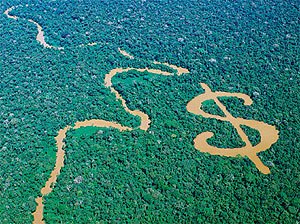When I’m not focusing on climate change in terms of the science and policy, I’m learning about climate change in terms of economics. My chosen class outside of the mosaic is Environmental Economics. As it turns out, I have a very themed semester because my economics professor specializes in the economics of climate change.
I’ve never been much of an economist. I love science and I love policy but figuring out how much Joe Smith should charge for his wooden chair has never been of much interest to me. From my perspective, economics and environmentalism often butt heads. The curriculum for environmental science majors at Dickinson has a large emphasis on economics classes. I think this is very practical; however, I never quite felt morally comfortable assigning all these economic values to humans and the natural world.
This semester I have a type of professor I’ve never had before. I have an economics professor who is also an environmentalist. I’m sure he would just call himself an environmental economist. I, however, am still working on merging the two worlds. I respect economics. I understand that it is advantageous to have proof that the cost of reducing CO2 emissions is lower than the regional environmental benefits, even if we don’t take the costs of climate change into account.
Now, this class is helping me to flesh out my issues with assigning monetary values to all benefits and costs. Disliking this aspect doesn’t mean that you aren’t a proper economist, to the contrary, many economists are currently debating this issue. One point in economist Frank Ackerman’s essay, “Climate Economics in Four Easy Pieces” is the idea that in cost-benefit analyses regarding climate change mitigation, some economists do not take into account the concept that all costs are not morally equal. The economic cost of strictly reducing emissions now compared to the cost of human lives in the future is not comparable.
When human lives or entire species are categorized as monetary values for comparison, some economists can forget what these dollar numbers actually represent. For example, if the cost to build a seawall is $2 billion and the cost of damage and deaths from a hurricane is $2 billion, then some economists might cite the situations as equal. Furthermore, if the hurricane was several years into the future, the damage cost may be preferable when taking into account a discount rate. However, we are comparing construction costs, which create jobs and improve infrastructure, to the cost of human suffering and death. These are not in the same category.
When considering whether to act on climate change now or suffer the consequences in the future, we must remember that we are not comparing apples to apples. The costs now (creating better infrastructure; building cleaner energy production resulting in cleaner air; inventing more efficient technology; implementing taxes on carbon emissions) are in no way morally similar to the costs we could face in the future (increased drought, fires, storms, flooding and erosion; food and energy insecurity resulting in famine and wars; an extinction of possibly half of the organisms on the planet; a rise in sea level resulting in mass migration of coastal cities). Many economists agree with this argument and are fighting to convey this logic to the public. Now, I realize that I am on their side.

